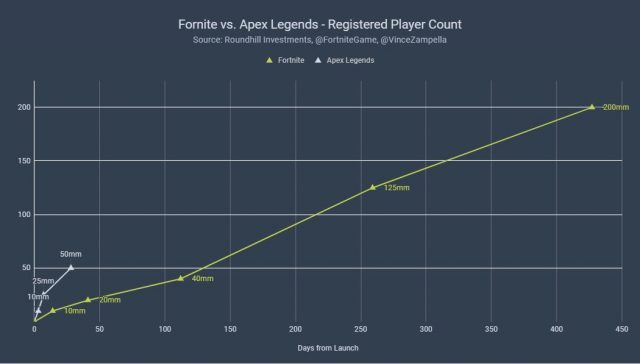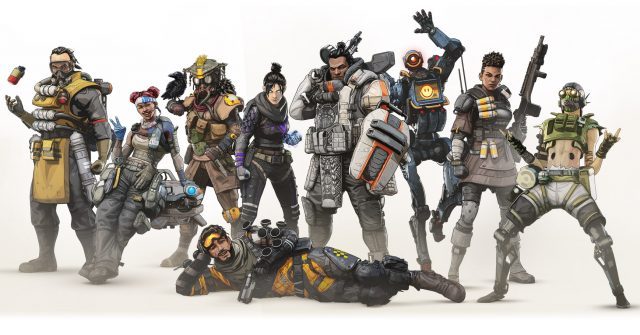
The stealth launch of Apex Legends from developer Respawn Entertainment has given way to a battle royale craze rivaling Fortnite. The game’s breakout success has far exceeded all expectations, reaching 50 million players in just four weeks. But what might that mean for the studio’s upcoming VR game?
To call Apex Legends a mere hit would be to undersell just how quickly it has reached orbit in the gamingsphere. With no prior announcement, the game was launched directly out of stealth development in February and in four weeks had been played by 50 million players. Its reach is still significantly smaller than battle royale heavyweight Fortnite, but its speed out of the gate has greatly outpaced it.

Apex Legends has also seized a significant portion of the game streaming audience, presently the 5th most watched game on Twitch in the last 30 days, according to TwitchMetrics.
So what does the unprecedented success of Apex Legends mean for a studio which has other projects on its plate, like an upcoming VR game which is surely exciting but decidedly less important in the grand scheme than its new breakout hit?
Respawn’s upcoming VR game is still very much a mystery. Despite being announced one and a half years ago, the studio still refers to it as their “super secret VR game.” All that’s really know about it right now is that it’ll be published by Oculus Studios as an exclusive and has been described by Respawn as a “AAA VR shooter game” and is confirmed to not involve Titanfall or Star Wars IP (which the studio works on separately). Oculus still hasn’t event confirmed which of its headsets the game will run on, and Respawn hasn’t even give the game a name.
Because the studio is talking so little about the project at this point, we’re largely limited to inference with regard to the impact of Apex on the VR game, but I’ve spoken to a number of games industry vets about the situation to understand what they consider plausible outcomes.
The first, it seems, is the very real possibility that Respawn has had to call ‘all hands on deck’, and diverted all available resources to supporting the sudden success of Apex with a broader scope of support, updates, marketing, etc than was initially forecast. This would be a temporary realignment of the company’s resources while they also attempt to grow to balance the ship.
On the surface at least, this looks to be supported by the studio’s current open job positions, 56% of which are for Apex roles while only 17% are for the VR project.

This shifting of focus could draw attention away from the studio’s VR game for a time—at least for those roles that had the flexibility to divert some time away from the VR project and toward Apex.
But of course the studio still has a deliverable to Oculus; the project must get done. If a portion of Respawn’s non-Apex resources did get focused on Apex for a time, eventually they will refocus on the VR project. How much the VR project actually gets disrupted depends on how cohesive the team was that was working on it in the first place, and to what extent that cohesiveness was jostled during the Apex frenzy.
But it isn’t exactly doom and gloom for the VR project; the breakout success of Apex could have some positive knock-on effects. For one, it could mean the studio is more successful and capable, which could mean a greater abundance of resources that can be directed toward the VR project in the long term compared to fewer if Apex had never happened. There’s plenty of positions at game studios which work across projects (especially on the engine/engineering side), and investments (in technology and talent) made to support and grow Apex could have positive, tangential impacts on Respawn’s VR game.
The success of Apex Legends could also give Respawn serious extra clout when it comes to interactions with parent company EA, which acquired Respawn a year and a half ago, shortly after the VR project was announced. EA is a very big company which owns a handful of major game studios. With Respawn hitting a grand slam on their first game release after the acquisition, it seems very likely that EA leadership will be more trusting of the decisions made by Respawn’s leaders. That gives the company some additional leverage to achieve its goals within the broader EA corporation.
For Oculus’ part, the company says that though it’s publishing the game, it’s hands-off on the VR project and happy to let Respawn do its own thing. In a wide-ranging interview with Facebook’s Jason Rubin at GDC 2019 last month, we asked whether or not the company was actively guiding the development of Respawn’s VR game.
“You do not partner with Respawn and then get involved in designing games for Respawn. Respawn is a fantastically talented company—as far many of the others that we work with: Insomniac, Sanzaru…—we let them design the product they want,” Rubin said. “So, absolutely, a Respawn product is a Respawn product.”
– – — – –
There’s no way we’ll know what impact Apex Legends will or won’t have on Respawn’s VR game until the company is actually ready to start talking about the game. When might we hear more? Our best guess is that we’ll see a proper announcement around or during the annual Oculus Connect event, which is typically held at the end of September.
The post What the Breakout Success of ‘Apex Legends’ Could Mean for Respawn’s Upcoming VR Game appeared first on Road to VR.